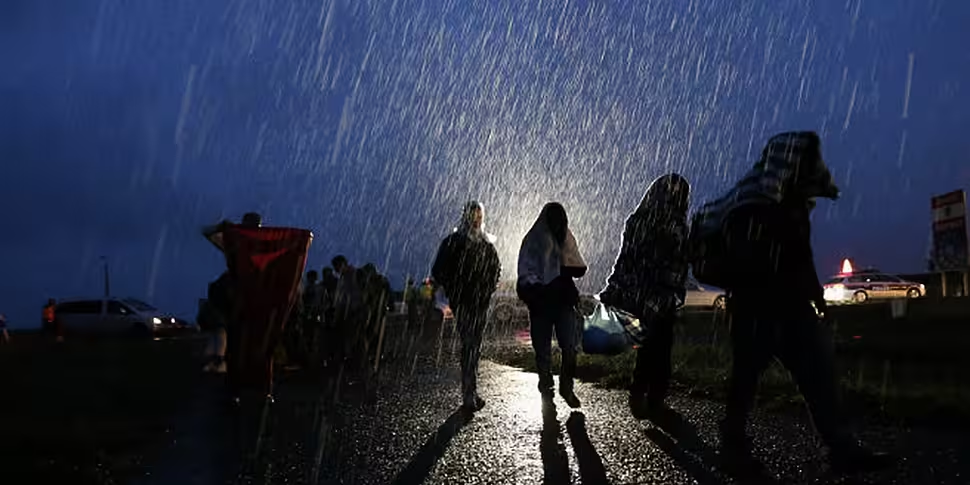The Tánaiste Joan Burton says thousands of refugees expected to be taken by Ireland will not be housed in direct provision centres.
Her comments come as concern is expressed about Government plans to house the refugees in places like disused army barracks.
Retired Supreme Court Judge and patron of the Irish Refugee Council, Catherine McGuinness, says the idea is "quite worrying".
Meanwhile, refugees coming here as part of the effort to relieve the crisis in Europe must not enter a new version of direct provision.
Justice McGuinness has described the idea as 'quite worrying' because of previous similar schemes.
She told Newstalk Breakfast if it goes ahead, there must be a long-term plan.
"If we are going to do that we have to think of what we're going to do after that" she said.
"It would be fair enough to say you're really at the end of your tether - as it were - when you arrive here and being housed in an army barracks, if proper provisions were made, would be alright".
"But let's not turn it into another version of the present direct provision system" she added.
Joan Burton says a figure of 5,000 refugees for Ireland is "in the mix", but that those coming from Syria will not end up in direct provision.
"The direct provision issue doesn't arise in the case of people coming from the conflict in Syria - because what we're getting from the EU Commission and indeed from the UN are proposals in relation to programme refugees, which means that they have status and leave to remain in the country for a period of time" she said.
"As I say if we can end the conflict through peace-making in Syria, then a lot of people will wish to return home" she added.
It comes as Hungary's Prime Minister calls on Germany to state they will not accept any more of the refugees travelling through Europe.
Viktor Orban has warned "millions" of people will descend on the continent if Berlin's open door policy continues - and criticised Austria for allowing refugees to "enter its territory without hindrance".
The right-wing leader also alleged that many of those who have worked their way through Turkey, Greece, Macedonia and Serbia to the European Union were not refugees in danger - but immigrants attracted to the prospect of a German lifestyle.
In an interview with Austrian television, Mr Orban claimed the crisis could also place an intolerable financial burden on EU nations, threatening the continent's "Christian welfare states."
Within the coming days, Hungary is planning to "seal off" its southern border with Serbia - effectively stopping any migrants or refugees from crossing over into the EU member state.
There are fears the 3.5m-high fence could cause dangerous bottlenecks in Serbia, as thousands of people continue their desperate journeys along the Balkan corridor in search of a better life.
Mr Orban has defended the controversial project, and insisted Hungary is "protecting Europe according to European rules that say borders can be crossed only in certain areas in a controlled way and after registration".
He described Hungary as the "black sheep" of the EU, and openly criticised its leadership's plans to introduce quotas to distribute refugees more evenly across the bloc's 28 member states.
The Prime Minister insisted such a system made no sense unless EU countries were able to protect their own borders.
Hungarian Government MP Bence Tuzson agrees they must control their borders to protect all EU countries, including Ireland.
Speaking to our reporter on the Serbian-Hungarian border, he said the authorities don't know who is coming through, and there needs to be more controls:
The Hungarian government wants those arriving along the southern frontier to be sent to refugee camps close by, but they are already oversubscribed. One site is meant to hold 1,000 people, but is currently home to 1,300.
More than 15,000 refugees arrived in Germany over the weekend, with moving footage emerging from Munich of families being reunited and refugees being cheered as they stepped off trains.
German Chancellor Angela Merkel told reporters: "We have a moving, in some parts breathtaking, weekend behind us".
800,000 expected by the end of the year
About 2,500 people are expected to arrive in Bavaria, the country's largest state, by early afternoon on Monday.
Mr Orban's vocal criticism of Berlin comes days after Germany said it was putting "no limit" on the number of refugees it would give sanctuary - with officials estimating up to 800,000 refugees will have arrived by the end of the year.
Early on Monday morning, after hours of meetings held by Angela Merkel's government, Europe's wealthiest nation confirmed plans to spend €6bn next year on supporting the hundreds of thousands of new arrivals.
However, new legal measures are being introduced which will make it easier to deport asylum seekers from countries considered as "secure states" - including Montenegro, Albania and Kosovo.
Those eligible to stay - often from Syria, Iraq, Afghanistan and Eritrea - will also receive more non-cash benefits in the future.
Germany's aid package is set to include improved housing and language classes for its refugees, along with bolstered federal police ranks.
Hours after Mr Orban's remarks, Mrs Merkel said: "Germany is a country willing to take people in, but refugees can be received in all countries of the European Union in such a way that they can find refuge from civil war and from persecution".
Meanwhile, French President Francois Hollande has said his country will welcome 24,000 refugees who have fled war.
Later today, British Prime Minister David Cameron will outline the UK government's plans to resettle thousands of Syrian refugees, after he dropped his opposition to taking in more people.
That followed the international outcry at images of three-year-old Aylan Kurdi, the Syrian boy whose lifeless body was found washed up on a Turkish beach after a failed crossing to the Greek islands.









